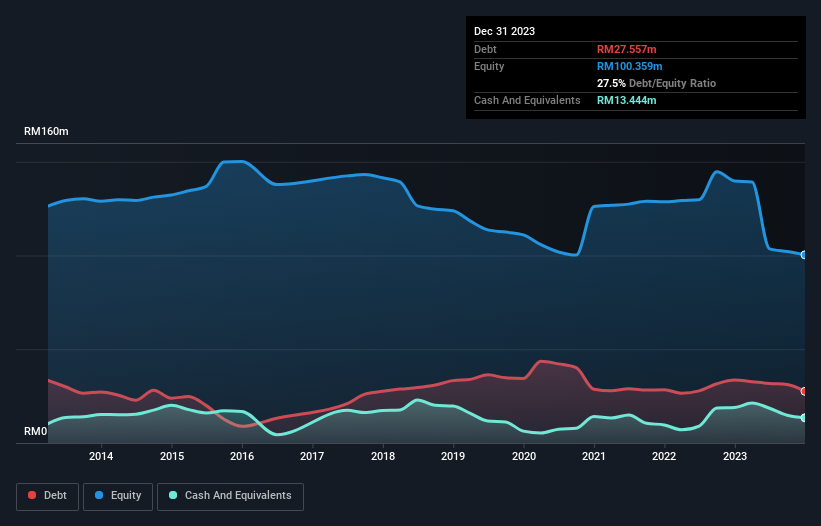
Warren Buffett famously said, 'Volatility is far from synonymous with risk.' So it might be obvious that you need to consider debt, when you think about how risky any given stock is, because too much debt can sink a company. Importantly, Rex Industry Berhad (KLSE:REX) does carry debt. But the more important question is: how much risk is that debt creating?
What Risk Does Debt Bring?
Debt assists a business until the business has trouble paying it off, either with new capital or with free cash flow. If things get really bad, the lenders can take control of the business. However, a more usual (but still expensive) situation is where a company must dilute shareholders at a cheap share price simply to get debt under control. By replacing dilution, though, debt can be an extremely good tool for businesses that need capital to invest in growth at high rates of return. The first thing to do when considering how much debt a business uses is to look at its cash and debt together.
Check out our latest analysis for Rex Industry Berhad
What Is Rex Industry Berhad's Debt?
You can click the graphic below for the historical numbers, but it shows that Rex Industry Berhad had RM27.6m of debt in December 2023, down from RM33.6m, one year before. However, it does have RM13.4m in cash offsetting this, leading to net debt of about RM14.1m.

How Healthy Is Rex Industry Berhad's Balance Sheet?
Zooming in on the latest balance sheet data, we can see that Rex Industry Berhad had liabilities of RM56.7m due within 12 months and liabilities of RM9.17m due beyond that. On the other hand, it had cash of RM13.4m and RM27.9m worth of receivables due within a year. So its liabilities outweigh the sum of its cash and (near-term) receivables by RM24.5m.
Rex Industry Berhad has a market capitalization of RM72.3m, so it could very likely raise cash to ameliorate its balance sheet, if the need arose. But it's clear that we should definitely closely examine whether it can manage its debt without dilution. When analysing debt levels, the balance sheet is the obvious place to start. But you can't view debt in total isolation; since Rex Industry Berhad will need earnings to service that debt. So if you're keen to discover more about its earnings, it might be worth checking out this graph of its long term earnings trend.
In the last year Rex Industry Berhad had a loss before interest and tax, and actually shrunk its revenue by 17%, to RM140m. That's not what we would hope to see.
Caveat Emptor
While Rex Industry Berhad's falling revenue is about as heartwarming as a wet blanket, arguably its earnings before interest and tax (EBIT) loss is even less appealing. Indeed, it lost a very considerable RM16m at the EBIT level. When we look at that and recall the liabilities on its balance sheet, relative to cash, it seems unwise to us for the company to have any debt. Quite frankly we think the balance sheet is far from match-fit, although it could be improved with time. For example, we would not want to see a repeat of last year's loss of RM42m. In the meantime, we consider the stock very risky. When analysing debt levels, the balance sheet is the obvious place to start. But ultimately, every company can contain risks that exist outside of the balance sheet. These risks can be hard to spot. Every company has them, and we've spotted 3 warning signs for Rex Industry Berhad (of which 1 is significant!) you should know about.
If you're interested in investing in businesses that can grow profits without the burden of debt, then check out this free list of growing businesses that have net cash on the balance sheet.
New: AI Stock Screener & Alerts
Our new AI Stock Screener scans the market every day to uncover opportunities.
• Dividend Powerhouses (3%+ Yield)
• Undervalued Small Caps with Insider Buying
• High growth Tech and AI Companies
Or build your own from over 50 metrics.
Have feedback on this article? Concerned about the content? Get in touch with us directly. Alternatively, email editorial-team (at) simplywallst.com.
This article by Simply Wall St is general in nature. We provide commentary based on historical data and analyst forecasts only using an unbiased methodology and our articles are not intended to be financial advice. It does not constitute a recommendation to buy or sell any stock, and does not take account of your objectives, or your financial situation. We aim to bring you long-term focused analysis driven by fundamental data. Note that our analysis may not factor in the latest price-sensitive company announcements or qualitative material. Simply Wall St has no position in any stocks mentioned.
About KLSE:REX
Rex Industry Berhad
An investment holding company, engages in the manufacture, distribution, trading, and export of halal canned food, frozen food, beverage, chocolate malt and premix products, and coconut milk.
Excellent balance sheet with acceptable track record.
Market Insights
Community Narratives



